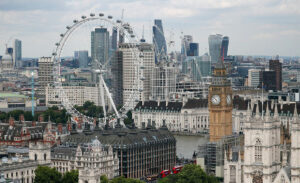LONDON – British inflation edged up in December to 4.0% from November’s 3.9%, according to figures released on Wednesday, but many economists think it could return to the Bank of England’s 2% target by April or May, sooner than in other countries.
That would also be far earlier than the BoE forecast at the start of November when it predicted inflation would stay above target until late 2025.
December’s surprise increase – which was driven largely by one-off effects from tobacco duty and air fares – comes after two months of much bigger-than-expected falls in the pace of price growth.
Here are more details about the outlook for inflation.
WHY HAS INFLATION BEEN FALLING?
British consumer price inflation peaked at 11.1% in October 2022, driven by surging European gas prices after Russia’s invasion of Ukraine in February that year, as well as by higher food prices and lingering disruption from the COVID-19 pandemic.
Since then, oil and gas prices have fallen while food prices are increasing less quickly.
At the peak, household bills including energy costs were contributing nearly 4 percentage points to the inflation rate, food prices added 2 percentage points and transport more than 1 percentage point.
Now household bills and transport costs are generally falling and lowering inflation by 0.5 and 0.2 percentage points respectively.
Food price inflation remains high at 8.0% in December, contributing 0.9 percentage points the overall 4.0% increase.
HOW DOES UK INFLATION COMPARE TO OTHER COUNTRIES?
British inflation in December was just below France’s 4.1% and above Germany’s 3.8% and the United States’ November reading of 2.1%, according to internationally comparable HICP measures provided by Britain’s Office for National Statistics. Across the euro zone as a whole, inflation was also lower than in Britain in December at 2.9%.
For much of 2023, British inflation was rather higher than in other advanced economies, due in part to Britain’s high reliance on gas for heating and power generation, and regulation that led to household energy bills rising and falling several months later than elsewhere.
WHEN WILL UK INFLATION RETURN TO TARGET?
Dutch bank ING and consultants at Capital Economics say British CPI will return to 2% in April – sooner than in the US or euro zone, even after December’s inflation surprise.
Citi, Deutsche Bank and Oxford Economics have predicted that inflation will fall to 2% or lower from the second quarter.
April is likely to see a 15% reduction in regulated energy tariffs which will lower the inflation rate by 1.5% while food price inflation is on track to slow towards 2%, ING predicts.
The BoE forecast at the start of November that inflation would average 4.6% in the final quarter of 2023 – compared with 4.2% in Wednesday’s data – and exceed 3% throughout 2024. It will update its forecasts on Feb. 1.
WHAT ARE THE RISKS INFLATION DOESN’T RETURN TO 2%?
For the BoE, rapid wage growth is the biggest challenge to returning inflation to 2% and keeping it there.
Before the pandemic, when inflation stayed close to 2%, wage growth was typically around 3%. After it, pay growth accelerated, reaching nearly 8% in mid-2023, excluding bonuses.
Higher wage bills risk being passed on to consumers through higher prices. Surveys suggest many employers plan to raise pay by around 5% this year, while the minimum wage – a big influence on hospitality and retail pay – is due to rise by 10% in April.
Many economists expect inflation will edge up again in January, when a 5% rise in regulated energy tariffs took effect.
Disruption to shipping in the Red Sea, linked to the conflict in Gaza, could impact prices too though so far the impact on Britain’s economy has been limited.
WHAT DOES IT MEAN FOR THE BANK OF ENGLAND?
Economists think lower inflation will allow the BoE to start cutting interest rates, probably from around the middle of 2024.
Financial markets see a 50-60% chance of an initial quarter-point rate cut in May, rising to a near certainty by June. They expect Bank Rate – currently 5.25% – to fall to around 4.25% by the end of this year.
The BoE’s stance for months has been that interest rates will need to stay high for an “extended period”.
BoE Chief Economist Huw Pill warned last year that big falls in inflation caused by lower energy prices should not make the central bank “declare victory prematurely”. – Reuters

